Close your eyes and imagine yourself in the workplace of your dreams. Sinking into a bean-bag, pina-colada in hand…or maybe just a regular swirly chair and some coffee, whatever floats your boat. Feels amazing, right? But you know what would feel even better? Turning this vivid visual into a reality and actually bagging the job you’ve wanted to do ever since your mom broke it to you that becoming a full-time princess just couldn’t happen. Whether you picture yourself as an investment banker, software engineer, teacher, professional dog-walker or full-time magician–I’m here to help, not judge.
But in the way of you and that dream-job stand dozens of other hopefuls just like yourself. The only chance you get to prove yourself comes in the form of the notorious interview. How do you maximize your allotted time with the interviewer and really make your mark?
Go in armed for combat with these 10 easy tools, recommended by experts:
1. Cover Letter and Resume: Name a Better Duo. (You Can’t)

I had to start this off with an oldie but a goodie. A resume and cover- etter combo should act as a staple in your interview tool-kit. “Even if you’ve sent it in before, you don’t know if your interviewer actually read it or had time to go through it in detail. There’s no harm in carrying a copy of your resume to an interview,” Digital & Social Media Manager at Horseshoe Media Trish Bautista said. So, make sure that you update your resume regularly and keep a folder full of crisp, printed copies so that you can save yourself a meltdown or two when your printer stops working ten minutes before your ride arrives.
If you dread churning out a separate cover letter for every position you apply to like me, I can assure you that when it ends up winning over your interviewer, you will be thanking past-you for tearfully typing one out. “Carrying a cover-letter is always a good idea because it shows you’re professional, you’re genuinely interested in the job and have done your research.” Publicist at EF Public Relations Mr. Keon Porter said. “A cover letter is a perfect complement to one’s resume and I prefer to look at it over a resume because it’s much more story-driven and focused. It tells me a lot more about a person than a resume does, and lets their personality shine through as well, in how they connect their experiences to the role.” Ensure that you are combing through your resume to highlight the skills and experience you really want to showcase, and then linking it back to the role you want to secure. Read it once, twice, thrice before printing and have a second pair of eyes look it over to make sure you haven’t gone completely overboard describing how your silver medal in that pickle-eating contest makes you a go-getter. You want to impress, not overwhelm.
2. Researchin’ is Rewardin’

I know that a lot of times you apply to multiple jobs at once, praying that at least one of them will come through. But just as bad as putting all your eggs in one basket proves, so does trying to carry too many baskets at once. In the end, you’ll end up dropping every last egg onto the marble floor with a loud splat. Make sure that no matter how many roles you apply for, you have done adequate research for each one and know what each entails. In this day and age, a good hour or so of internet FBI work can’t keep much from you. Look up the company, read up about the role and have your facts down. “You need to display a deep understanding of what the job is about,” Partner at Access Capital Partners Mr. Manish Pandey said. “Be prepared and come in with your research done. Are you genuinely interested in this job or just applying for the sake of it? Know the role inside-out, and don’t hesitate to ask questions to fill in the gaps.” On the day of the interview, set aside ten minutes to brush up on the information you’ve found so that you don’t end up blanking out in front of the interviewer.
Doing your research beforehand will not only make you feel more confident with your new-found knowledge, but you also communicate to the interviewer that you mean business. “You can tell if someone has looked up your company or clients, and when they are able to give me an example of their work and relate it to the research they’ve done, I really think that makes them stand out,” Bautista said. Trust me, using your stellar ‘research’ skills for good and applying them beyond Instagram and Facebook proves as a real game-changer.
3. Genuineness Over Geniuses
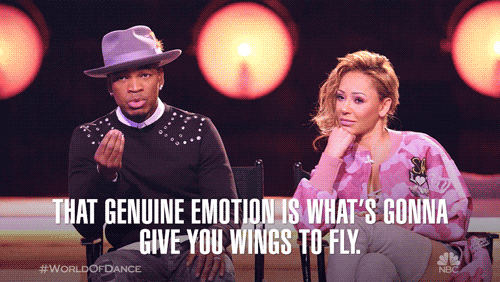
You might have been valedictorian at your high school where no one really knew you till the graduation ceremony. You might think you’re god’s gift to academia. You might have been in the gifted program till college broke you. But when you give a job interview, none of this matters. Yes, you majored in something smart-sounding thinking it would make you money, good for you. But believe me, interviewers aren’t on the lookout for geniuses; they want someone who seems genuine and sincere, someone they enjoy talking to.
Look, don’t cry–I am not saying that the 4.0 GPA you sacrificed most of your social life to scrape together proves completely futile. I’m just saying that from an interview perspective, it matters less than how personable and warm you come across as. “A genuine interest in learning more about the field or industry you are looking to go into outshines the list of skills listed on a piece of paper. At the end of the day, an interview is just a genuine conversation so you should be able to hold the interviewer’s interest by demonstrating your own interest,” Porter said. If you get summoned to an interview, they probably already think highly of your intelligence.
But if ‘smart’ sums up all you are, then we might have a problem because at the end of the day, most jobs involve working collaboratively in a somewhat social setting and no one wants to be stuck working with pedantic Paul who has the personality of a salted cracker. And if you had planned to hide your lack of a personality behind a screen during a quarantine interview, don’t count on that. “A lot of your personality can be communicated even in a virtual interview; interviewers are likely to focus more on questions geared towards getting to know you more as a person. I think that it’s easy to tell how confident someone is, and how genuinely interested they are in the role just from the way they answer,” Pandey said. Jokes aside, genuineness doesn’t have to be difficult- if you consider yourself sincerely interested in a role, it will show. And if you aren’t, well, did you even read point #2?
4. Unquestionably Good Questions

How does a job interview differ from a police interrogation? Well, in one you have a two-way conversation and in the other, you just sit there and try to convincingly lie whilst questions get fired at you. If you can’t figure out which is which, you’ve probably been having a rough time trying to land a job. “I always enjoy interviewing a candidate who asks questions because it shows that they’re making an effort to connect with me. And in the case of online interviews, given the lack of other communication cues like body language, the interviewee should really prioritize asking follow-up questions in order to build engagement,” Porter said. Stay engaged throughout the whole interview. Don’t blow your shot by passively listening.
So, the next time an interviewer asks if you have any questions, please don’t breathe an audible sigh of relief and make a beeline for the door because they’ve ended the questioning. No, actually come up with some questions of your own–it shows your interest in knowing more, and better conceals the fact that your social anxiety is counting down to when you can leave. “As an interviewee, you should be treating a virtual interview just as you would an in-person one. Definitely come in with your questions prepared; interviewers appreciate someone who shows they are curious to know more about the role and are really open to learning,” Pandey said. In the meantime, you should come up with your list of questions while researching before the interview, as this will encourage you to dig deeper, really think about how you can benefit from the role and how they can benefit from hiring you.
5. A Formal ‘Fit that Shows You’re the Right Fit
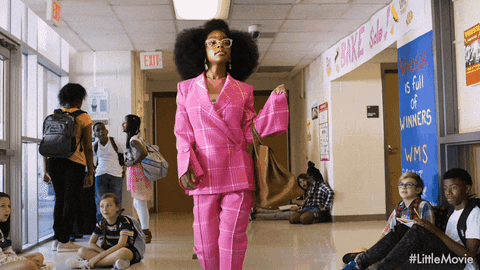
If I had a dollar for every time I groaned at the “business casual” dress code for an interview, I wouldn’t even need a job. But unfortunately, appropriate attire is key to making a good first impression. If you show up sloppily dressed in sweatpants and the t-shirt you slept in, you’ll likely come across as laid back. Too laid back.
Err on the side of caution and dress professionally even if the interview invite doesn’t explicitly call for it. Not sure what to wear? “You can’t go wrong with a blazer or tailored suit. One of the first things I notice about an applicant is if they are well-dressed because it communicates that they’re professional and put together. When in doubt, dress more professionally than less,” Porter said. Even if you can’t find a blazer, at least find a crisp shirt or a dress your grandma would approve of. Well-fitted clothing can do wonders, trust me. Besides, this isn’t Milan Fashion Week- no one expects you to show up dripping in Gucci; in fact, I would advise against that. “You don’t want to stand out because of your clothes–dress conservatively but professionally,” Pandey said. Looks like so would our experts.
Truth be told, you might struggle to find a matching tie or the right length skirt when getting ready, so please pick your outfit well ahead of time and keep it ironed, steamed and ready. Just one less thing to be worrying about on the day of the interview.
6. Konfidence, but Don’t Make it Kardashian
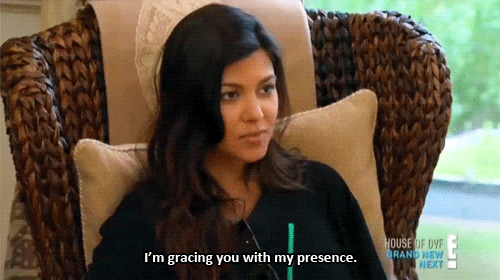
Yes, confidence is key, but perhaps reserve strutting around like a peacock because unlike your mom, your potential-employer may not appreciate your constant narcissism. Remember, a job offers an opportunity to learn and grow, because no matter how brilliant you consider yourself, Chad, always remember the scope for growth. “What we look for is confidence, not cockiness. Enthusiasm that is balanced with a dose of modesty,” Pandey said. That being said, you should also ensure that you don’t show up to the interview shaking and visibly on the verge of tears. After all, if you don’t believe in yourself, why should the interviewer?
As intimidating as it may seem, you really want to present the best version of yourself to your interviewer. Nerves and jitters seem natural, but even if you think that landing this job could make your career, remind yourself that it’s just a person on the other side of that door (or screen), and not a flesh-eating monster. “You never know how an interview is going to go till you actually get there and give it, so there’s no point worrying yourself unnecessarily beforehand. A confident candidate always makes a better first impression than a nervous one, “Porter said. Before an interview, take a moment to just do nothing but focus on your breathing, giving yourself a quick little mental pep-talk before you begin. And if you consider yourself the kind of person who starts sweating at the mere thought of getting interviewed, set up some mock-interviews with a college counselor, trusted friend, parent or mentor.
Deep breaths, baby. “What I notice first about an interviewee is how relaxed and confident they are. Of course, it’s difficult to be relaxed in an interview, but I think if they make an effort to connect with you human-to-human that says a lot about how easy they might be to work with. Additionally, if the interview is virtual, the work might also be virtual, so even if you’re more confident behind a screen, as long as that’s consistent, you should be able to flourish regardless,” Bautista said. Lucky for you, confidence proves easy to fake–good posture, a steady handshake, an easy smile. That’s all it takes.
7. Throw in a Little Creativity, Sweetie

Interviewers have busy schedules, so they typically interview job applicants back-to-back, without much of a break in between. They might even forget your face by the end of the day if you haven’t given them any reason not to. To stand out from a sea of average Joes, pack a little oomph into your answers. Crank up that creativity a little so that your interviewer doesn’t feel tempted to shut you out and think about their lunch plans instead.
However, don’t abandon reason in the name of creativity; you still want to come across as a critical thinker. “It’s all about how you approach the questions we ask you–so make sure your answers are well thought out and distinctive. We really like to see if you can think on your feet. We usually give you a case-study and ask you to walk us through as you work on it so that we can see how you think. It’s not about finding the right answer as much as it is about the process of arriving at an answer,” Pandey said. Creativity may look like it involves a fair bit of spontaneity, but you can definitely train yourself to think more creatively by going through some atypical interview questions beforehand.
Do you really think your interviewer will believe that your biggest weakness is ‘perfection’? Snooze. The last guy said that, and the guy before too. Switch it up, take a different approach…but maybe resist the urge to spill the beans about your drinking problem or serious commitment issues.
8. Pack a Punch with Plenty of Passion
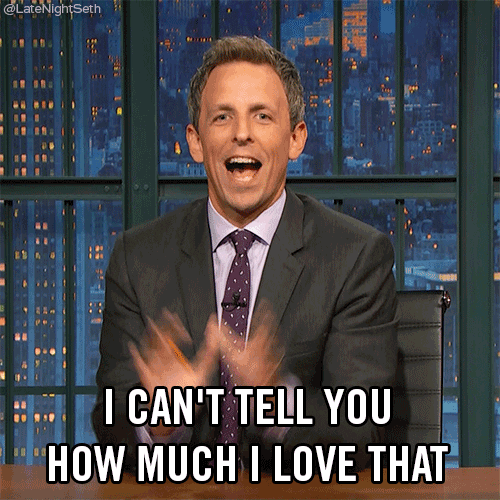
Take a second to think about why you want this job. I hope, for your sake, that ‘passion’ makes it to at least the top three on your list. As cheesy as it may sound, passion keeps most of us going. Whether you adore painting, writing, coding or drinking unholy amounts of boba, everyone feels passionate about something. If you genuinely want to bag this job, you must try to show the interviewer that the position closely intertwines with your passion.
For an entry-level job, you’re unlikely to have a ton of experience anyway, so you might as well bank on blowing them away with sheer passion. It really breathes life into the saying ‘quality, not quantity,’ right? “More often than not, it’s not the amount of experience you bring with you that matters but rather if you were passionately involved in the roles you did take up. Showing that you have passion for the field you are going into is key. Passion doesn’t have to depend on your area of study or major, it can and often will, go well beyond that. Whether you’re into film, TV, writing–as long as you are passionate, that makes you stand out, ” Porter said. The best thing about having youth on your side includes the fact that you have all the time in the world to cultivate your passion. Actively participate in each role you take up in and outside of the classroom because you have something to learn from each experience–a way to strengthen your passion.
9.(Free) Samples Galore!

You know why I love the free samples at Trader Joe’s? No, not just because I’m too broke to actually buy myself some of those delicious pumpkin-spiced cupcakes, but because it allows me to taste the product before I buy it. In the same way, interviewers often like to see what their prospective employees have to offer before they decide to invest in them. You see, if you go in with a resume filled with words borrowed from the thesaurus and job experiences stolen from your brother, the interviewer will know right away.
Substantiate your claims with evidence from your past work. If you want to go into consulting and have worked on case study competitions before, show this to your interviewer. If you want to become a copy editor, bring the articles you helped edit in your college paper. Basically, if you’ve done anything remotely linked to the role you want to secure, then carry a couple of examples for your interviewer to go over so that they know you’re not full of fluff. “Carrying a portfolio of your previous work is quite helpful because it lets you illustrate the skills listed in your resume a lot better. For Marketing, this could be graphic design or writing samples–anything that demonstrates your past experiences. And if it’s a virtual interview, feel free to screen-share and show your work. That shows initiative.” Bautista said. Hence, curate a folder of your best work or consider starting a free blog featuring it for easy reference, because everyone loves free samples.
10.Enthusiasm More Contagious than a Cold
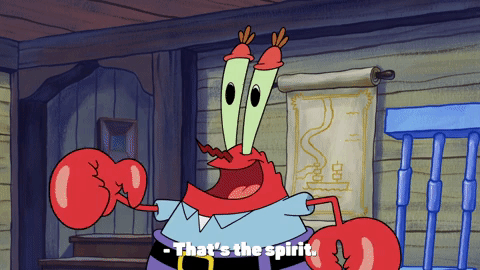
Remember our friend no-personality, Paul? Yeah, he isn’t a big hit at the office. And you won’t be either if you forget to bring your enthusiasm to the interview. You say you really want this job? I’m sure you do. But the interviewer can’t get inside your head, so it comes down to you to show them how much you really want it. “Meeting someone in person is definitely a different experience from meeting them online, but even through a video-call you’re able to tell if someone is passionate and enthusiastic.” Mr. Porter said. Especially as a young person, people expect you to have enthusiasm–and why shouldn’t you? Yes, while the economy currently nears collapse, having the chance to pursue your passion and contribute to something meaningful should still be treasured. And if you identify as a STEM major stuck in a field you don’t want to be in, well at least you have the opportunity to make some serious cash. Let that act as a motivator, if nothing else does.
If you express a sincere dose of enthusiasm, most interviewers will warm up to you immediately. “Especially in a field like mine (Finance), where we work closely in small teams for long hours, it is important to be open-minded and enthusiastic, to display a willingness to learn from the get-go. By the time you get to the interview stage you’ve already made it through a couple of rounds of filtration, so the interviewer already knows your background and what’s in your resume. When you walk into that room, it’s more about if I can see myself working with you, as a person. And who wants to work with someone they don’t like?” Pandey said. Basically, think about your least favorite co-worker or classmate and make a mental list of the things about them that bother you. Done? Now rip it to shreds because you don’t want to be able to tick off a single thing on that list.
And of all the things you bring to the interview, remember to bring an appropriately comfortable pair of shoes so you can enthusiastically put your best foot forward.
Ready to start your career journey by nailing that summer internship? Check out four steps that make it easy here.



















